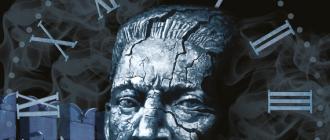Educated, vulnerable, amorous - many interesting facts about Yesenin refute the myth of his naivety and simplicity. He called himself “a bawdy and a brawler,” “ the last poet villages,” he seemed to be in plain sight: he was joking, drinking, rowdy, and swearing. But he remained misunderstood, which undoubtedly accelerated his death. So what was Sergei Yesenin really like?
- As a child, Serezha was raised by his grandfather, in addition to his mother.. Fyodor Titov, despite his peasant origin, was an educated and intelligent man. The boy's first playmates were adult uncles living in the same house with his grandfather.
- Yesenin was erudite and persistent, had a good education for those times: graduated with honors from the Zemstvo School, then from the parochial school. It is noteworthy that while studying in Konstantinovo he was retained for the second year in the 3rd grade due to bad behavior.

- Yesenin could have become a teacher, but the teaching field did not appeal to him. Back in adolescence he firmly decided that he would become a poet. Sergei wrote his first verse when he was 8. At the age of 15, his poetic creativity became systematic, he sent some of his works to a lyric competition and, in the end, moved to Moscow.

- In the capital, Sergei initially lived and worked for his father in a butcher shop. Then, to be closer to literary circles, he got a job as a worker at a printing house. Among the interesting facts about writers is Yesenin’s meeting with Blok. The aspiring poet, working in a printing house, tried to make useful contacts, but this did not give any tangible results. Then he, having learned Blok’s address, came to him for an audition.

- In 1913, Yesenin had a office romance with Anna Izryadnova, which ended in a civil marriage and the birth of a son, Yuri. Their family did not last long: a year later the poet packed his things and left for Petrograd. As Izryadnova later recalled, the last time she saw Yesenin before his death was when he came to say goodbye. A tragic future awaited their joint son: in 1937, Yuri was shot, accused of preparing an assassination attempt on Stalin.

- During the First World War, Yesenin served as an orderly on a military field train., under the patronage of Empress Alexandra Feodorovna. Together with other poets, he repeatedly performed in Tsarskoe Selo before members of the imperial family.

- In 1917, Sergei signed with actress Zinaida Reich. New marriage lasted four years, during which the couple rushed between Orel, where Reich’s parents lived, and Moscow, and did not live together for a long time. Then followed a painful breakup, which led Zinaida to nervous exhaustion. A year later, the actress married director Meyerhold. He also adopted Yesenin’s children – Kostya and Tanya.

- Crowded literary evenings were commonplace at the beginning of the 20th century. Yesenin recited not only his own poems, but also the works of Bely and Blok. While reading, he gestured expressively and tried to imitate the speech style of the authors.

- Yesenin had a very difficult relationship with Mayakovsky. Both were intolerant, publicly criticized each other, often without mincing words. At the same time, contrary information has also been preserved, where each of the poets recognizes the talent and significance of the ideological opponent.

- For some time Yesenin was a vegetarian. According to eyewitnesses, he had two phobias - fear of police officers and fear of syphilis.

- Yesenin's second official wife was Isadora Duncan, a famous American dancer.. Accompanying his wife during the tour, Sergei traveled all over Western Europe, visited the USA. A tragic love story with jealousy, scandals, and assault ended in a breakup. Yesenin fell in love with someone else and stayed in Moscow.
- There are a lot of assumptions about Yesenin’s death - from suicide due to depression to murder for political reasons. Marina Tsvetaeva often thought about the poet’s death, suggesting that he was ruined by the need to adapt to modern Soviet realities.

We know Yesenin from school as a hooligan and drunkard, praising Blue Rus' and women. But there are those who remain outside the scope school curriculum. The brilliant poet always surprised his friends and family with risky actions that lifted him to the top of Olympus and dragged him into the abyss of despair.
From childhood, Yesenin stood out among his peers; he did not particularly long to be a worker, although he dearly loved his homeland and could wander through the fields for hours, enjoying the province. From the age of 5, the poet’s grandfather Titov was involved in his upbringing; he was distinguished by his high intelligence and education. It was he who attracted Yesenin’s love for literature, and his grandmother constantly told folk tales. In such an atmosphere it was impossible not to grow up as a sensual and loving person. Later he was raised by his mother.
He went to study at the Parish School, graduated with honors and went to Moscow to visit his father. The father worked in a butcher shop, but the son could not sustain this activity for even six months.

An interesting fact about Yesenin: since childhood, the boy believed that he would become a famous Russian poet. He began writing his first poems as a teenager. And now he told his father that he would earn money by making rhymes, would not go on to study, and would not stay in the butcher shop. Yesenin got a job as a worker in a printing house, closer to the publishing business, and therefore to writing and Russian poets. At this time, he read the poems of A. Blok for the first time and began to consider him his teacher.
Yesenin tried to break into the circles of writers; he met everyone who could help him in some way. As a result, he decided not to wait for “weather by the sea”, found out Blok’s address and came to him, declaring himself as a future famous poet. Blok became interested in such audacity, he met him and demanded to read poetry without lyrical digressions. An interesting fact is that Blok was delighted with Yesenin’s work - this brought the poet into the long-awaited literary circles.
Don't miss it! From life: Dalai Lama
- Yesenin was married 4 times (not counting his many hobbies).

- Yesenin considered Galina Benislavskaya a friend and companion, and she loved him. After the death of the poet, Benislavskaya shot herself at his grave and was buried near Yesenin.
- Yesenin had two interesting phobias - a terrible fear of the police and a panicky fear of contracting syphilis.
Yesenin biography: interesting facts about Yesenin
- At one time Sergei Yesenin was a vegetarian.
- Isadora Duncan, Yesenin’s most famous woman, saw in him her son, who died in infancy. Duncan did not speak Russian, Yesenin did not speak English, but in passionate quarrels their dialogue consisted of a linguistic mixture of swear words. This amused my friends a lot.
- After Yesenin’s death, Isadora died tragically and absurdly: she got out of a taxi, and her long scarf pinched the car door, the car started moving and suffocated the great dancer.
- Even though Yesenin and Mayakovsky showed disdain for each other in public, in reality each admired the talent of his opponent. An interesting fact in Yesenin’s biography: Mayakovsky once read his poems and exclaimed at the top of his voice: “Damn talented!” But he sternly demanded that everyone in the room never tell anyone about it.

The work of Sergei Aleksandrovich Yesenin is familiar and dearly loved by more than one generation in our country. Quiet lyrical sadness, love for the Motherland, aching longing for peasant, bastard Rus' run like a red thread in all the works of this great Russian poet of the early twentieth century.
The poems “Birch”, “The golden grove dissuaded...”, “Letter to mother”, “Give me a paw, Jim, for luck...”, “Now we are leaving little by little...” and many others are familiar to us from school, in poetry Yesenin wrote many songs. They teach us kindness, compassion for our neighbors, love for our native land, elevate and spiritualize us.
The life of S. A. Yesenin was tragically cut short in at a young age, at the peak of creativity and popularity. But his wonderful works will forever remain the spiritual heritage that is national treasure Russia.
Learning the biography of Yesenin, interesting facts from the life of the poet, we are immersed in the era of young Soviet Russia, which was characterized by numerous disagreements in the society of that time and, perhaps, was the reason for his early death.
A nugget from the Russian hinterland
Sergei Yesenin was born on September 21 (October 3 to modern style) 1895 in the village. Konstantinovo, Ryazan province, in a simple peasant family.
Since S. A. Yesenin’s father was almost constantly in Moscow, working in a shop there, and visited the village occasionally, Yesenin was raised by his maternal grandfather and grandmother and three uncles (mother’s brothers). From the age of two, Serezha’s mother went to work in Ryazan.
Yesenin’s grandfather, Fyodor Titov, knew church books well, and his grandmother, Natalya Titova, was an excellent storyteller of fairy tales, sang many songs and ditties, as the poet himself later admitted, it was she who gave the impetus to writing the first poems.
By the age of five, the boy learned to read, and in 1904, at the age of 9, he was sent to a rural zemstvo school. After studying for five years, he graduated from college with honors. Then, in 1909 and until 1912, the teenager Sergei Yesenin continued his studies at a parochial school in the village of Spas-Klepiki, receiving the specialty “literacy school teacher.”

The first steps on the creative path
In 1912, after graduating from the Spaso-Klepikovskaya school, S. A. Yesenin briefly worked in Moscow with his father in a butcher shop. After leaving the shop and working in the printing house, Yesenin meets his future common-law wife Anna Izryadnova, who bore him a son. At the same time, Yesenin became part of the Surikov circle of literature and music.
In 1913, S. A. Yesenin became a volunteer student at the Faculty of History and Philosophy of the Shanyavsky Moscow City People's University. There is an interesting fact about Yesenin that during this period he communicated closely with revolutionary-minded workers, which explains the police’s interest in his personality.
In 1914, his works were published for the first time in the magazine “Mirok”; the first collection of poems was published in 1916 and was called “Radunitsa”. In 1915, Yesenin broke up with Izryadnova and left for Petrograd, meeting Russian symbolist poets there, and in particular A. Blok. Life in Petrograd brought him fame and recognition; his poems then began to be published in many publications.
War and revolution
At the beginning of 1916, Yesenin was drafted into the army and served as an orderly on the Tsarskoye Selo military ambulance train under the Empress. But despite close acquaintance with royal family, Yesenin ends up in a disciplinary unit because he refused to write a poem in honor of the Tsar. In 1917, the poet left the army without permission and joined the Social Revolutionaries, as he himself said, not as a party member, but as a poet.
The events of the revolution quickly captured the passionate nature of the poet. Accepting it with all his soul, Yesenin created his revolutionary works “Otchari”, “Octoechos”, “Jordan Dove”, “Inonia”, etc.

In 1917, S. A. Yesenin meets and falls in love with Zinaida Reich. In their official marriage they had a daughter, Tatyana, and a son, Konstantin. But three years later, the marriage broke up due to the poet’s amorous nature.
In 1918, the poet leaves for Moscow, his life is filled with the changes that the revolution brought: hunger, devastation and terror sweep across the country, collapse peasant life, and poetry salons are filled with a motley literary public.
Imagism and Isadora
In 1919, Yesenin, together with A. B. Mariengof and V. G. Shershenevich, became the founder of imagism - a movement whose essence is imagery and metaphor in the works created. Yesenin accepts active participation in the organization of the imagist literary publishing house and cafe “Stable of Pegasus”.
But soon he becomes bored with elaborate metaphors, since his soul still lies in the ancient ways of the Russian village. In 1924, Yesenin terminated all relations with the Imagists.
In 1921, the American dancer Isadora Duncan came to Moscow, who six months later would become Yesenin’s wife. After the wedding, the newlyweds went on a trip to Europe and then to America, where Yesenin lived for 4 months.
In this trip around the world the poet was often rowdy, behaved shockingly, drank a lot, the couple often argued, although they spoke different languages. Having lived in the place for a little while more than a year, they break up upon returning to Russia.

Last years of life
In 1923-1924. Yesenin continues to travel a lot around the country, having visited Central Asia, and in the Caucasus, in Murmansk and Solovki. He visits his native village of Konstantinovo many times, lives in Leningrad or Moscow.
During this period, the poet’s collections “Poems of a Brawler” and “Moscow Tavern”, “Persian Motives” were published. In search of himself, Yesenin continues to drink a lot, and is often overwhelmed by severe depression.
In 1925, Yesenin married the granddaughter of Leo Tolstoy, Sofya Andreevna. This union lasted only a few months. In November 1925, against the backdrop of a difficult physical and moral condition, and perhaps in order to protect him from arrest, S.A. Tolstaya assigned him to the Moscow psychoneurological clinic.
Yesenin finishes two years of work on one of his last works, “The Black Man,” in which he imagines his entire past life as a nightmare.
After spending about a month in the clinic, the poet escapes to Leningrad and on December 24 stays in a room at the Angleterre Hotel. On the night of December 27-28, a poet who committed suicide and his last poem, “Goodbye, my friend, goodbye...” written in blood, are discovered in the room.

There are other interesting things about the Russian poet:
- Yesenin's uncles - adult single sons of his grandmother and grandfather - had a cheerful, perky disposition, often played mischief and in their own way, with rather specific methods, raised the boy. So, having first put three-year-old Seryozha on horseback without a saddle, they let the horse gallop. And they taught the boy to swim in the same way - they got to the middle of the lake in a boat and threw him into the water. But at the age of eight, as Sergei Yesenin later recalled interesting facts from childhood, at the request of a neighbor, he swam instead of a hunting dog, picking up shot ducks.
- The boy writes his first poems at the age of 8-9 years. The poems are simple, unpretentious and reminiscent of ditties in style.
- Instead of the required four years of study at the zemstvo school, due to bad behavior, Seryozha is left for the second year. This interesting fact about Yesenin speaks of his rebellious character, which manifested itself in adolescence.
- The poem “Birch” is the poet’s first published work.
- The poet does not go to the front, perhaps due to such an interesting fact about Yesenin that in the spring of 1916, Empress Alexandra Feodorovna herself listened to his poems. The poet even traveled around Crimea with the royal couple.
- In 1918, Yesenin promised to get paper, which was in acute shortage at that time, for his friends from the publishing house “Labor Artel of Word Artists.” To do this, he, dressed in peasant clothes, went straight to the Presidium of the Moscow Council, where the paper was issued for the needs of “peasant poets.”
- Yesenin dedicated the poem “Letter to a Woman” to Zinaida Reich. After her marriage to Yesenin, she married theater director V.E. Meyerhold, who adopted Yesenin’s son and daughter.
- Isadora Duncan, the third wife of A. S. Yesenin, was 18 years older than him. In marriage, they combined their surnames, both signing Duncan-Yesenin.
- An interesting fact about Yesenin and Mayakovsky is that they were eternal opponents and criticized each other's work. However, this did not prevent them from recognizing the talent of another behind their backs.
- After writing the poem “Country of Scoundrels,” where Yesenin writes impartially about Soviet power, persecution begins in the newspapers, accusations of drunkenness, rowdyism, etc. Yesenin even had to hide from prosecution on one of his trips to the Caucasus.
- The poet's death became one of the greatest mysteries of the twentieth century. Yesenin's corpse was found hanging at a height of three meters. According to one version, they decided to remove him as objectionable to the Soviet regime. And he wrote the poems in blood due to the lack of ink.
To summarize, we can say that Yesenin’s life, biography and interesting facts are proof that a large-scale personality cannot be confined to any framework and limited by political regimes. Sergei Yesenin is a great Russian poet who, in his individual, unique creativity, glorifies the Russian soul, so passionate, vulnerable, rebellious and wide open.
Is there at least one person in the world who is not indifferent to poetry who does not know about Sergei Yesenin? Unlikely... The great poet has received recognition all over the world, his poems are studied by literary scholars, and in general his work has served as an example to follow for many generations of poets. Yesenin forever wrote himself into the history of world literature.
- In his native Ryazan village, he successfully studied at a church-teacher’s school, but after a year and a half he quit classes because he did not feel a craving for pedagogy.
- Having moved from the outback to Moscow, 17-year-old Yesenin pursued the only goal - to become the greatest poet in Russia.
- In Moscow, Yesenin made a living through a variety of occupations - he managed to work in a printing house and in a butcher's shop. In his free time from work, the future poet spent a year and a half as a volunteer student at the university.
- During the war, the poet managed to get a job as an orderly on a train under the patronage of the empress. The poet also had the opportunity to read poetry several times before the imperial family in Tsarskoe Selo.
- In the early 1920s, Yesenin, who had turned from a village youth into a libertine and rowdy, met Isadora Duncan. The poet was 18 years younger than his chosen one and did not know English language, and she didn’t understand a word of Russian, but that didn’t stop Yesenin and Duncan from getting married. However, this marriage soon broke up. The dancer outlived the poet by only a few years, tragically strangling herself with a scarf.
- Yesenin's son from his first common-law wife, Yuri Izryadnov, was executed on false charges - it was alleged that he was preparing an attempt on Stalin's life.
- Mayakovsky did not like Yesenin, but the poet reciprocated his feelings. True, each of the rivals recognized the other’s undeniable talent.
- Blok, on the contrary, considered Yesenin a genuine talent. He introduced the village boy into the literary environment and helped him make a career (facts about Blok).
- It is known that Yesenin did not eat meat for several years.
- First legal wife Yesenina became Zinaida Reich. The two children born to her from the poet over three years of marriage were raised not by Yesenin, but by her second husband Reich, the famous director Meyerhold.
- Yesenin loved to drink, and during drunken revelries he entertained the audience with obscene poems - obscene and obscene quatrains were instantly born in the poet’s head and were immediately forgotten by him.
- In the mid-1920s, the poet became involved in several criminal cases - he was accused of hooliganism and anti-Semitic statements.
- His last wife was Tolstoy's granddaughter. This marriage also did not bring family well-being to the poet, however, it was this woman who later became his widow ().
- Shortly before Yesenin’s death, his wife agreed on his treatment in a private mental hospital. Having left there, the poet withdrew all the money from his accounts and left for St. Petersburg.
- Soon after arriving in St. Petersburg, Yesenin was found hanged in his hotel room. The day before, he gave his latest work to a friend - the poet complained that there was no ink in the hotel, so he had to write the lines with his own blood.
- The circumstances of the death of the 30-year-old poet are still shrouded in mystery. It is officially believed that the poet committed suicide due to deep depression, but there are also arguments in favor of the fact that the poet was killed due to disagreements with the USSR authorities.
- Yesenin was buried with great honors in Moscow. Soon, one of the poet’s lovers and his secretary, Galina Beneslavskaya, committed suicide at his grave.
Square
We know Yesenin from school as a hooligan and drunkard, praising Blue Rus' and women. But there are interesting facts about Yesenin that remain outside the scope of the school curriculum. The brilliant poet always surprised his friends and family with risky actions that lifted him to the top of Olympus and dragged him into the abyss of despair.
Since childhood, Yesenin stood out among his peers; he did not particularly long to be a worker, although he dearly loved his homeland and could wander through the fields for hours, enjoying the natural splendor. From the age of 5, the poet’s grandfather Titov was involved in his upbringing; he was distinguished by his high intelligence and education. It was he who instilled in Yesenin a passionate love of literature, and his grandmother constantly told folk tales, sang ditties and taught her grandson interesting sayings and parables. In such an atmosphere it was impossible not to grow up as a sensual and loving person. Later he was raised by his mother.
He went to study at the Parish School, graduated with honors and went to Moscow to visit his father. The father worked in a butcher shop, but the son could not sustain this activity for even six months. He declared himself a future great Russian poet and set off to conquer his fatherland. First - service, then - readings with the Empress, later - final fame throughout the country.

- The poet’s main idol was A. Blok. It was this writer who assessed Yesenin’s first poems from the point of view of professionalism. The young poet also amused Blok with his persistence and rustic manners.
- Yesenin was married 4 times (not counting his many hobbies).
- Yesenin considered Galina Benislavskaya a friend and companion, and she loved him. After the death of the poet, Benislavskaya shot herself at his grave and was buried near Yesenin.
- Yesenin had two interesting phobias - a terrible fear of the police and a panicky fear of contracting syphilis.
- At one time Sergei Yesenin was a vegetarian.
- Isadora Duncan, Yesenin’s most famous woman, saw in him her son, who died in infancy. Duncan did not speak Russian, Yesenin did not speak English, but in passionate quarrels their dialogue consisted of a linguistic mixture of abusive words. This amused my friends a lot.
- After Yesenin’s death, Isadora died tragically and absurdly: she got out of a taxi, and her long scarf pinched the car door, the car started moving and suffocated the great dancer.
- Even though Yesenin and Mayakovsky showed disdain for each other in public, in reality each admired the talent of his opponent. An interesting fact in Yesenin’s biography: Mayakovsky once read his poems and exclaimed at the top of his voice: “Damn talented!” But he sternly demanded that everyone in the room never tell anyone about it.







